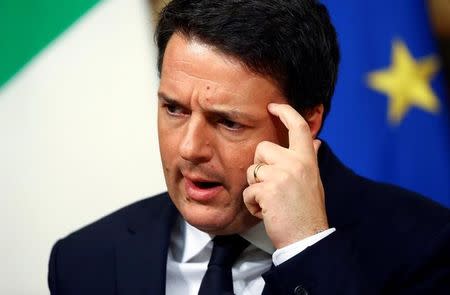Renzi should stay in power even in defeat - Italian minister

By Crispian Balmer and Giselda Vagnoni ROME (Reuters) - Prime Minister Matteo Renzi should not leave Italy in the lurch if he loses a forthcoming referendum but should remain in charge to help overcome the fallout, Industry Minister Carlo Calenda said on Friday. Renzi says he will quit if voters reject his constitutional reform package at the Dec. 4 ballot, and financial markets are jittery over the prospect of political instability as opinion polls point to probable defeat for the government. In a interview with Reuters, Calenda said he remained optimistic that the 'Yes' camp would prevail, arguing that Italians would ultimately back the plans to curb the role of the upper house Senate and reduce the powers of the regions. But he said Renzi should back away from his threat to resign regardless. "My personal opinion is that Renzi should stay," he said, speaking in his 1930s-era office on Rome's upmarket Via Veneto, with huge designs by Renaissance artist Leonardo da Vinci covering the walls. Some opposition parties want immediate national elections a year ahead of schedule if Renzi loses the referendum. But most politicians say the electoral law will first have to be rewritten because it only covers the lower house of parliament. Drafting a new law is likely to take several months, during which time Italy will need a new government if, as he has repeatedly promised, Renzi walks away from power. One option would be for the president to appoint a non-political cabinet headed by technocrats, as happened in 2011 when former EU Commissioner Mario Monti took charge at the height of a financial crisis. But Calenda, who is himself a technocrat and not a member of the ruling Democratic Party (PD), said Italy's many problems demanded a political response. "My personal opinion is that this is not the time for a technical government," said Calenda, a close Renzi ally who has a life-sized cardboard cutout of British World War Two leader Winston Churchill alongside his desk. The first problem that is likely to explode in the wake of a 'No' vote will centre on Italy's third largest bank Monte dei Paschi di Siena, with the troubled lender set to launch a 5 billion euro ($5.3 billion) cash call on Dec. 7 or 8. Worried about rising political risks, investors are waiting on the outcome of the referendum before deciding whether to pump funds into Monte dei Paschi. If they stay on the sidelines, the state will have to jump in to prevent the bank from collapsing. Calenda declined to talk about the crisis-battered banking sector, but said Italy needed strong government. "What needs to be considered, and in this respect the President of the Republic will play a key role, is what is good for the country in the given context," said Calenda. President Sergio Mattarella is Italy's supreme political arbiter. If Renzi hands in his resignation, the head of state could reject it and ask him to return to parliament and seek a new mandate - one that specifically included electoral reform. Renzi could refuse, but he might face pressure to reconsider if the country faced a full-blown banking crisis. Economy Minister Pier Carlo Padoan, who is widely seen as a possible replacement for Renzi at the head of a technocrat government, added his voice on Friday to those who thought the prime minister should stay in office regardless of the vote. "What the country needs is a political government that can continue to make reforms, which is this government," he told Sky TG24 TV. (Reporting by Crispian Balmer; editing by Mark Heinrich)

